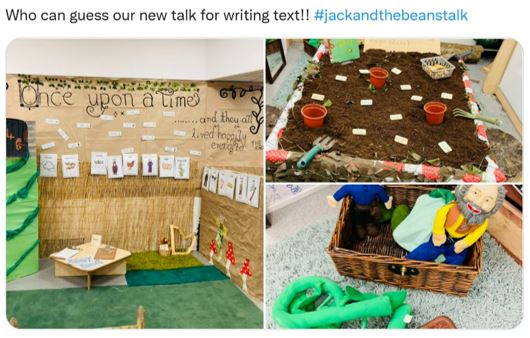Writing
At Macaulay Primary Academy, we believe writing to be a fundamental part in allowing children to access all areas of the curriculum. Our aim is to develop children into confident and creative writers who, above all else, find enjoyment in writing. Through a multi-sensory and interactive teaching approach we hope to enable children of all ages and abilities to learn to write a wide range of text types and genres. Activities we provide for the children to achieve this include:
- Listening to and exploring texts and stories
- Taking part in drama and role-play
- Immersing the children through hook lessons
- Story mapping
- Using oracy techniques
- Collecting adventurous vocabulary to use appropriately
- Building their working knowledge of grammar through text interrogations



Talk for Writing
Talk for Writing is used as a basis for how we teach writing across the academy. Children work on 2 – 3 week writing cycles writing bot fiction and non-fiction texts across a range of genres. The cycle consists of three stages:
Imitate
The children internalise a high-quality model text, creating actions to help them remember it. They will pick the text apart looking at the audience they will be writing for and the purpose for the use of language and grammatical features. During this stage they will also story map and box up the text, so they are confident for the next stage.
Innovate
The children will begin to produce their own ideas through short burst writing sessions and create a toolkit of rules to follow for their own writing. Following this, along with the teacher, the children produce a shared piece of writing that features all the good examples seen in the model text.
Independent Application
Finally, the children will be able to apply all the knowledge and skills they have learnt throughout the cycle, with support from the working walls and washing lines, to their own independent piece of writing.

Grammar and Punctuation
Throughout the Talk for Writing cycle, we provide children with numerous opportunities to learn new grammatical skills in addition to embedding grammar and punctuation that has previously been taught. This is mapped out through both long-term progression plans and year group assessment documents to ensure coverage. We use text interrogations to identify all of the key grammatical features in the model texts, so the children understand the purpose of why those features have been used and the impact it has on the reader. The children can then refer to these as a base to edit and improve their own writing throughout the remainder of the cycle. We have developed a Cold Task to Hot Task assessment tool specifically for punctuation and grammar that allows us to clearly identify areas in learning that children need to develop further, thus providing an individualised learning experience through jumpstarts at the start of the session.

Vocabulary
Vocabulary is an integral part of children’s learning at Macaulay Primary Academy, and we interlink this into everything we do. During the Talk for Writing process, we ensure we expose the children to a wide range of ambitious vocabulary that challenges their thinking and stretches their imagination. We build on this through many activities, many oracy based, such as: VR Headsets, Word Waiters, OSIE grids and Short Burst Writing. We believe that vocabulary is not solely exclusive to writing sessions, so we also endeavour to make regular links to the vocabulary the children are exposed to in reading sessions and all other areas of the Reading Enhanced Curriculum as key acquisition of language is one of the three priorities that our curriculum centres around. We provide the children with many resources to support their knowledge of vocabulary such as: co-build dictionaries, thesauruses, and iPads. Moving forward, we are launching the use of vocabulary wheels to further enable the children to challenge themselves in their writing.

Spelling
Spelling is interweaved within our Talk for Writing programme so our children can apply spelling in meaningful ways, building on previous learning. Spelling is also taught discreetly through specific spelling sessions and interventions for targeted children. In EYFS and KS1, this is taught through the ELS programme and common exception words are practised both in school and at home. In KS2 we follow created a robust long-term plan to ensure children are exposed to and applying age-appropriate rules. We use this alongside the No- Nonsense spelling programme which explains and provides examples of each spelling rule.
